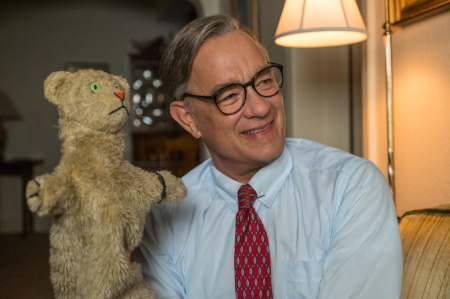'Mister Rogers' Neighborhood' was Fred Rogers' mission field, wife Joanne says

PITTSBURGH, Pa. – Joanne Rogers said her husband, Fred Rogers, saw himself as a minister first, and his long running children's show, PBS' "Mister Rogers' Neighborhood," as his mission field.
“A Beautiful Day in the Neighborhood” starring Tom Hanks is now in theaters, giving viewers a glimpse into how beloved TV personality Fred Rogers practiced his Christian faith by helping others navigate through life’s difficulties.
"One of the most important things we accept and know is that Fred was first and foremost a minister in the Presbyterian Church,” Joanne Rogers told The Christian Post on Thursday.
“He was ordained as an evangelist to continue his work that he was doing with family and children. That work was his ministry. There was never a time that he ever forgot that,” she maintained.
Rogers worked in television for more than 30 years after graduating college. The only breaks he took from working in television were times he devoted to his Christian faith. The TV pioneer attended Pittsburgh Theological Seminary where he was ordained as a Presbyterian minister in 1963.
"When he graduated from the seminary, he won the homiletics prize, which means he was a good preacher,” Joanne celebrated.
Although faith was the driving force of his life, Joanne Rogers told the filmmakers that for “A Beautiful Day in the Neighborhood” it was imperative they not portray him as a saint, because his godly character was a result of the practice he put into his religious convictions.
Author of The Simple Faith of Mister Rogers, Amy Hollingsworth revealed that Rogers fervently prayed for his life to be an overflow of what he received from God.
"What he told me, the first time I met him, he said, 'Every morning when I walk in that studio door, I pray, Dear God, let some word that is heard be yours,'” Hollingsworth told CP. “Even though he wasn't allowed to talk about God on TV. He started out each program by asking God please let some word that is heard be yours.”
Countless people have shared testimonials of the impact the PBS show creator had on them despite never being able to share his faith on the mainstream channel.
"He said in a letter to me, a quote that's attributed to St. Francis of Assisi, which is, 'preach the gospel at all times, If necessary use words.’ He did use words. He used words with me. He sent me sermons that he wrote, eulogies that he wrote, in his letters he was deeply theological and deeply spiritual.
"He prayed to God, he got up every morning at five and he read the scriptures and he prayed every morning. He prayed, he reflected, he spent time in silence. He prayed for the people that he loved. He cultivated that so when you got around him, there he was overflowing with peacefulness,” Hollingsworth described of some of those disciplines.
Several people who knew Rogers repeatedly shared with this reporter the following quote.
“'I'm so convinced that the space between the TV set and the viewer is holy ground,’” Hollingsworth recalled hearing him say.
He explained the quote further to Hollingsworth by saying, “What we put on TV can, by the Holy Spirit be translated into what that person needs to hear and see and without the translation of the Holy Spirit, it's all dross as far as I'm concerned.'”
Bill Isler, a longtime friend of Rogers and former president of the Fred Rogers Company, said “Mister Rogers Neighborhood” was a mission field for the Pennsylvania native.
"He was very proud that the charge was to serve children and families via the media and the media at that time that was emerging was TV. That was in the early 60s,” Isler shared.
“Mister Rogers Neighborhood” was created to help children accept themselves just the way they are.
"There is a story that he used to love to tell that when he was in homiletics class and they were on vacation, he went to Sunday service, and he took notes about everything the minister was doing wrong. After the sermon, the woman in front of them turned around with tears in her eyes, and said, 'he said exactly what I needed to hear.' And Fred said, ‘It was a lesson to me that she came in need, and I came in judgment,” Isler stated.
"When you hear these things, you understand how he really wrote that neighborhood, people are coming to you in need and you can't be going in judgment,” he added.
"A Beautiful Day in the Neighborhood," tells the story of reporter Tom Junod who was on assignment to write a profile on the TV icon and although he was initially cynical and begrudgingly took the assignment, Junod's perspective on Rogers changed as his life was transformed by his friendship with Rogers.
Junod's profile on Rogers, "Can You Say... Hero?" was published in Esquire in 1998. The journalist talks about how he learned to pray and describes some of his experiences with the Presbyterian minister. The piece gives readers a feel for Rogers' essence while exploring what he thinks children lose as they grow up.
Rogers died of stomach cancer at age 74 in 2003. He was survived by his wife of 51 years, Joanne Rogers, and sons James and John.
When asked if he kept his strong faith until the end, Hollingsworth said he stayed steadfast.
"He never wavered. The last letter I got from him was three weeks before he passed away,” she said.
“A Beautiful Day in the Neighborhood” is now showing in theaters nationwide.





















